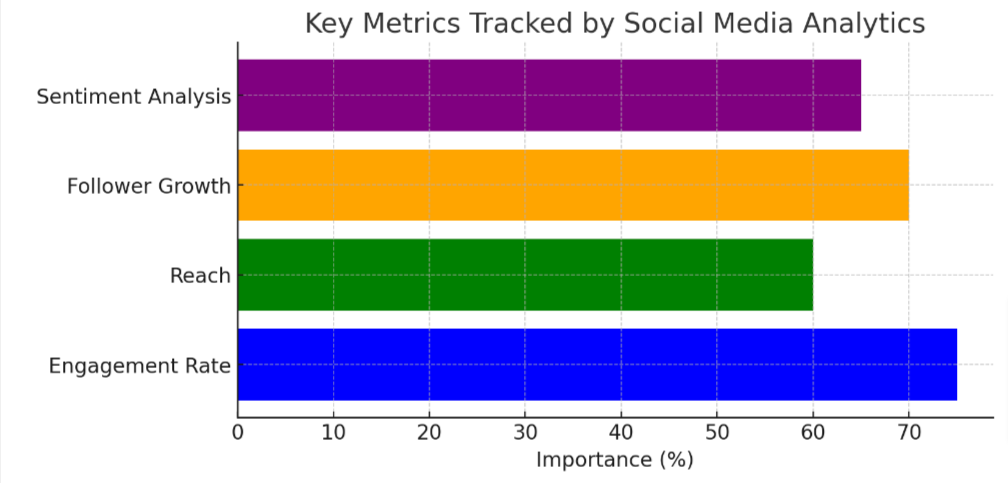Leveraging Analytics for Impactful Social Media Reviews
Struggling to make sense of your online reviews? Research shows that 90% of consumers read reviews before visiting a business. This article will teach you how to use social media analytics to turn those reviews into actionable insights and boost your reputation.
Keep reading, it’s easier than you think!
Key Takeaways
- Social media analytics can pinpoint trends and measure audience feelings, so you know what people like or don’t like about your brand.
- Using tools like Sprout Social, Google Analytics, and Rival IQ gives detailed reports on how well your social media is doing.
- Keeping an eye on competitors’ social media helps you figure out how to make yours better.
- Influencer marketing can spread the word about your brand and build trust through recommendations from popular online personalities.
- Personalizing your content for different parts of your audience can make them feel more connected to your brand.
What is Social Media Analytics?
Social Media Analytics is the process of gathering and analyzing data from social media platforms to make informed business decisions. It helps businesses identify trends, measure audience engagement, and track the performance of their social media marketing efforts.
Importance for businesses
Understanding the impact of social media analytics is a game-changer for businesses aiming to stay ahead in today’s digital marketplace. It provides insights that enable companies to craft data-driven decision-making strategies, optimizing their online presence and customer engagement.
By analyzing consumer interactions and feedback, businesses can adjust their tactics promptly to improve brand perception and bolster online reputation management.
Effective use of these analytics tools equips businesses with competitive intelligence analysis, allowing them to monitor industry trends and gauge competitor performance. Through this lens, they are better positioned to refine their marketing approaches, ensuring resources are allocated effectively for maximum return on investment (ROI).
Tailoring content based on sentiment analysis helps build a more authentic connection with audiences, potentially leading to enhanced reviews and sustained growth.
Identifying trends and sentiment
Keeping up with what’s hot or not on social media can make or break your online presence. Trend identification is like having a roadmap for where the crowd’s attention is heading.
It allows you to hitch a ride on viral topics and use the momentum to boost visibility for your brand. By diving into data-driven decision making, businesses can tailor their content to fit these trends, ensuring they stay relevant and engaging.
Sentiment analysis digs deep into customer feedback, sorting out the positive buzz from negative chatter. This piece of social media analytics shines a spotlight on how people feel about your product or service in real-time.
With this insight, reputation management becomes more proactive as you address concerns quickly and amplify satisfaction wherever possible. Accurate sentiment analysis helps shape marketing strategies that resonate emotionally with your audience leading to stronger brand perception and loyalty.
Setting goals and proving ROI
Setting clear goals is the first step to leveraging social media analytics. You want to establish what success looks like for your brand, whether it’s growing your follower base, boosting engagement, or driving sales.
Once you’ve set these targets, social media data analysis becomes a powerful asset. It helps you track progress and adjust strategies in real time.
Proving ROI from social media efforts can often seem challenging. But with the right metrics at hand, you can demonstrate value effectively. Look beyond likes and shares; measure how well your content performs against your goals by analyzing conversion rates and customer feedback analysis.
This datadriven decision making enables businesses to allocate resources wisely and refine their online reputation management for improved outcomes.
Types of Social Media Analytics
Performance analysis, audience analytics, competitor analysis, paid social analytics, influencer analysis, and sentiment analysis are all important types of social media analytics that can provide valuable insights for businesses.
Performance analysis
To analyze the performance of your social media content, use metrics such as engagement rate, click-through rate, and conversion rate. These figures will help you understand how well your content is resonating with your audience and driving them to take action.
By regularly conducting performance analysis, you can identify which types of posts or campaigns are most effective in achieving your marketing goals, enabling you to optimize your content strategy accordingly.
Evaluating the performance of your social media efforts allows you to make informed decisions about future content creation and posting schedules based on what engages your audience best.
Audience analytics
Understanding your audience is crucial for any successful social media strategy. By leveraging audience analytics, you can gain valuable insights into the demographics, interests, and behaviors of your followers on various social media platforms.
This data-driven approach allows you to tailor your content and engagement strategies to better resonate with your target audience, ultimately leading to improved brand perception and consumer insights.
By utilizing tools such as Sprout Social and Google Analytics, businesses can measure their organic social media impact while optimizing their marketing strategies based on the preferences and habits of their online community.
Audience analytics also empowers brands to identify potential influencers within their audience demographic, allowing for more strategic partnerships that align with the interests of their followers.
Furthermore, this data can be leveraged to enhance customer feedback analysis by understanding sentiment trends and refining product or service offerings in response to customer input.
Competitor analysis
Moving on to competitor analysis, understanding your competitors’ performance and strategies is crucial for shaping your own social media marketing strategy. By conducting a thorough competitor analysis, you can gain valuable insights into what is working well in your industry and identify areas where you can differentiate yourself.
This process involves evaluating their content strategy, engagement metrics, audience demographics, and overall brand perception to measure their impact and inform your own marketing decisions effectively.
Analyzing your competitors’ social media presence helps in benchmarking your performance against theirs, identifying opportunities for improvement, and ultimately enhancing your digital marketing efforts.
Paid social analytics
Transitioning from competitor analysis to paid social analytics, businesses can gauge the effectiveness of their paid social media campaigns. Tracking ad performance and engagement metrics offers valuable insights into ROI and audience behavior.
By leveraging paid social analytics, brands can optimize ad spend and target specific demographics to improve customer acquisition.
Measuring organic social media impact is crucial for understanding how consumers respond to both unpaid and sponsored content. It allows organizations to fine-tune their marketing strategies based on data-driven decisions, aligning with consumer preferences and market trends.
Influencer analysis
Influencer analysis involves identifying and evaluating individuals who have a significant impact on your target audience. By examining the reach, engagement, and credibility of influencers within your industry, you can determine potential partnerships to amplify your brand’s message.
Leveraging social media analytics for influencer analysis allows businesses to identify key advocates who align with their values and goals while providing access to a broader audience base.
Utilizing influencer analysis not only enhances brand visibility but also boosts credibility through authentic endorsements. By collaborating with influencers whose followers resonate with your brand, you can drive meaningful conversations and foster trust among potential customers.
Sentiment analysis
By understanding the sentiments expressed by your audience on social media, you can gain valuable insights into how they perceive your brand. Sentiment analysis allows you to gauge whether the feedback is positive, negative, or neutral, enabling you to tailor your strategies accordingly.
Monitoring sentiment through social media analytics tools helps in comprehending brand perception and customer insights, thus informing data-driven decision-making for marketing strategies.
This method also aids in online reputation management and enhancing consumer engagement.
Utilizing sentiment analysis not only measures organic social media impact but also provides a deeper understanding of how consumers interact with your brand online. It enables businesses to uncover trends in customer feedback and adjust their tactics based on real-time consumer sentiments.
Best Social Media Analytics Tools
Discover the features and benefits of top social media analytics tools like Sprout Social, Google Analytics, and Rival IQ, and learn how to get started with Sprout Social’s free trial.
Ready to elevate your review game with data-driven insights? Keep reading to find out more!
Features and benefits of Sprout Social, Google Analytics, and Rival IQ
When it comes to measuring the success of your social media efforts, the right tools can make all the difference. Sprout Social, Google Analytics, and Rival IQ each offer unique features and benefits that cater to various aspects of social media analytics. Here’s a quick rundown of what each platform brings to the table.
| Tool | Key Features | Benefits |
|---|---|---|
| Sprout Social | – Comprehensive reporting- Profile and keyword monitoring- Social listening- Customer relationship management (CRM) features | – Unifies social media messages in one inbox- Tracks campaign performance- Gathers actionable insights- Helps maintain strong customer relationships |
| Google Analytics | – Traffic and user behavior tracking- Conversion measurement- Customizable reports- Integration with Google Ads | – Provides deep insight into website performance- Measures the impact of social media on site traffic- Allows for data-driven decision making- Optimizes advertising spend |
| Rival IQ | – Competitive benchmarking- Social channel analytics- Head-to-head comparison- Alerts for major shifts in competitor strategies | – Identifies industry standards- Pinpoints areas for improvement- Offers strategic insights on competition- Keeps you abreast of market changes |
Using these platforms strategically can yield insights that help refine your approach and ultimately foster better reviews through improved audience engagement and performance.
How to get started with social media analytics using Sprout Social’s free trial
To get started with social media analytics using Sprout Social’s free trial, follow these steps:
- Sign up for a free trial of Sprout Social by visiting their website and entering your email address.
- Once you have access to the platform, explore the dashboard and familiarize yourself with the various features and tools available for social media analysis.
- Connect your social media accounts to Sprout Social to start collecting data on engagement metrics, audience demographics, and performance indicators.
- Use the reporting tools provided by Sprout Social to generate comprehensive analytics reports that help in understanding the impact of your social media efforts.
- Experiment with different search queries and filters to conduct sentiment analysis on customer feedback, brand perception, and consumer insights across various social media platforms.
- Utilize the listening capabilities of Sprout Social to monitor conversations, track keywords related to your brand or industry, and identify trends that can inform your marketing strategies.
- Take advantage of Sprout Social’s team collaboration features to share insights and collaborate with colleagues on interpreting the data and making data-driven decisions for your social media strategy.
- Engage with the support resources provided by Sprout Social, including tutorials, webinars, and customer support, to maximize your understanding and utilization of their analytics tools during the free trial period.
Enhancing Customer Service with Social Media Analytics
Monitor customer sentiment, personalize audience engagement, utilize influencer marketing, and improve performance to enhance your reviews. Read more about how social media analytics can take your customer service to the next level!

Monitoring sentiment
Monitoring sentiment on social media platforms is crucial for understanding how customers perceive your brand. By using sentiment analysis tools, businesses can track and analyze mentions of their brand in comments, reviews, and posts to gauge whether the overall sentiment is positive, negative, or neutral.
This information can be used to make strategic decisions and improve customer relations by addressing concerns promptly and enhancing positive feedback.
Analyzing sentiment also provides valuable insights into consumer perception trends over time. By carefully monitoring sentiment across various social media channels, businesses can gain a deeper understanding of customer satisfaction levels and identify potential areas for improvement.
Additionally, this data allows companies to adapt their marketing strategies based on consumer reactions quickly.
Personalizing audience engagement
To personalize audience engagement, use social media analytics to understand your followers’ preferences, behaviors, and interests. Tailor your content based on the data collected; this can include creating specific messaging for different segments of your audience or adjusting posting times to match peak activity periods.
Utilize sentiment analysis to gauge how your audience feels about specific topics or products; this insight will guide you in crafting more resonant and relatable messages that connect with your audience’s emotions.
By tracking engagement metrics such as likes, shares, and comments on various social media platforms, businesses can identify what type of content resonates most with their audience.
Utilizing influencer marketing
– Personalizing audience engagement is crucial, and another effective way to enhance your social media reviews is by utilizing influencer marketing. Collaborating with influencers within your industry can help expand your brand’s reach and credibility, leading to increased engagement and positive reviews.
By partnering with influencers who resonate with your target audience, you can leverage their influence to promote your products or services authentically.
– Leveraging influencer marketing also helps in building trust with potential customers as they are more likely to trust recommendations from individuals they follow and admire. This strategy allows you to tap into the influencer’s loyal followers effectively and potentially drive more positive sentiment around your brand.
Improving performance
To improve performance, businesses should regularly analyze social media engagement metrics and measure organic impact. By understanding the significance of social media analytics, companies can optimize their digital marketing strategies and make data-driven decisions.
This includes enhancing marketing strategies using relevant tools for free social media analysis to monitor sentiment, review analysis, and customer feedback.
Analyzing sentiment through various methods provides crucial consumer insights for reputation management and brand perception. In addition, utilizing social media data helps in measuring success and effectively enhancing marketing strategies to improve evaluations by comprehending important online reputation management indicators.
Tips for using social media analytics effectively.
- Improving performance helps to maximize the impact of social media analytics.
- Regularly monitor and measure your social media metrics to track progress and identify areas for improvement.
- Use A/B testing to experiment with different strategies and determine which ones yield the best results.
- Dive into audience analytics to understand your followers’ demographics, behaviors, and preferences, enabling you to tailor content more effectively.
- Leverage sentiment analysis to gauge the overall perception of your brand and adjust your strategy accordingly.
- Keep a close eye on competitor analysis to stay ahead of industry trends and identify opportunities for differentiation.
- Utilize influencer analysis to collaborate with influencers who align with your brand values, reaching wider audiences authentically.
- Incorporate paid social analytics for insight into ad performance and ROI, optimizing ad spend based on data-driven decisions.
- Utilize social media analytics tools that offer comprehensive reports and actionable insights, empowering informed decision-making for successful campaigns.
Conclusion
Incorporating social media analytics into your review strategy can revolutionize how you understand and engage with your audience. By monitoring sentiment, personalizing engagement, and leveraging influencer marketing, businesses can gain valuable insights to improve performance and enhance their reputation.
The use of social media data can empower companies to make informed decisions that drive success in the digital era.

